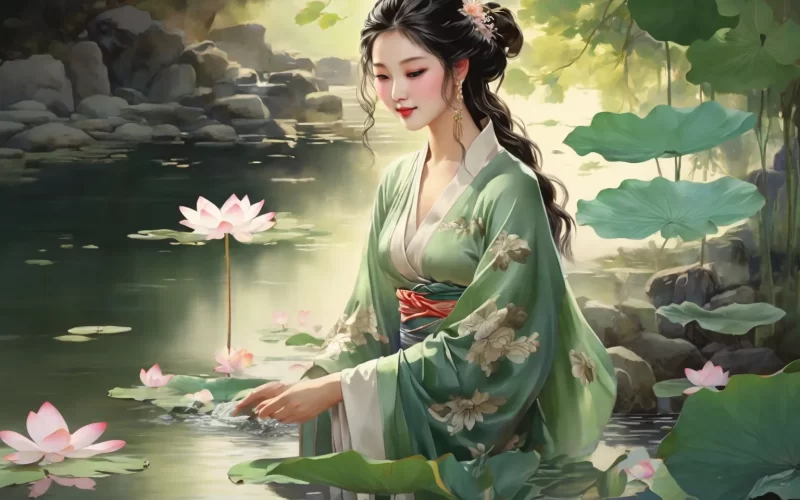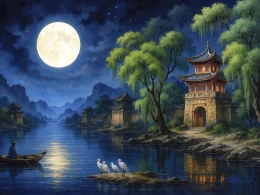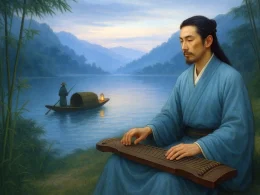I am only an old woodsman, whispering a sob,
As I steal like a spring-shadow down the Winding River.
...Since the palaces ashore are sealed by a thousand gates --
Fine willows, new rushes, for whom are you so green?
...I remember a cloud of flags that came from the South Garden,
And ten thousand colours, heightening one another,
And the Kingdom's first Lady, from the Palace of the Bright Sun,
Attendant on the Emperor in his royal chariot,
And the horsemen before them, each with bow and arrows,
And the snowy horses, champing at bits of yellow gold,
And an archer, breast skyward, shooting through the clouds
And felling with one dart a pair of flying birds.
...Where are those perfect eyes, where are those pearly teeth?
A blood-stained spirit has no home, has nowhere to return.
And clear Wei waters running east, through the cleft on Dagger- Tower Trail,
Carry neither there nor here any news of her.
People, compassionate, are wishing with tears
That she were as eternal as the river and the flowers.
...Mounted Tartars, in the yellow twilight, cloud the town with dust.
I am fleeing south, but I linger-gazing northward toward the throne.
Original Poem
「春宫怨」
杜甫
早被婵娟误, 欲妆临镜慵。
承恩不在貌, 教妾若为容?
风暖鸟声碎, 日高花影重。
年年越溪女, 相忆采芙蓉。
Interpretation
"A Sigh in the Spring Palace" is a poem from the Tang Dynasty that reflects the sorrow and resentment of a palace maid who has fallen out of favor. On the surface, the poem depicts the maid's lament, but it also serves as a metaphor for the poet's own feelings of unrecognized talent and frustration with the injustices of the world. Through the maid's plight, the poet expresses his own discontent with a society that fails to appreciate true worth.
First Couplet: "早被婵娟误,欲妆临镜慵。"
Zǎo bèi chánjuān wù, yù zhuāng lín jìng yōng.
Long ago, my beauty led me astray; now, facing the mirror, I have no heart to adorn myself.
These lines use the term "beauty" (婵娟) to symbolize the maid's youthful allure, which initially brought her into the palace. However, the word "led astray" (误) suggests that her beauty, rather than bringing her happiness, has become a source of regret. The maid's reluctance to adorn herself before the mirror reflects her inner sadness and self-pity, as she realizes that her beauty has not brought her the favor she once hoped for.
Second Couplet: "承恩不在貌,教妾若为容?"
Chéng ēn bù zài mào, jiào qiè ruò wéi róng?
Favor is not won by beauty; why should I care about my appearance?
This couplet delves deeper into the maid's disillusionment. She realizes that favor in the palace is not granted based on beauty but on flattery and political maneuvering. The rhetorical question "why should I care about my appearance?" (教妾若为容) reveals her resignation and self-mockery, as she acknowledges the futility of her efforts to win favor through her looks.
Third Couplet: "风暖鸟声碎,日高花影重。"
Fēng nuǎn niǎo shēng suì, rì gāo huā yǐng chóng.
The warm breeze carries the fragmented songs of birds; the high sun casts layered shadows of flowers.
On the surface, this couplet describes the vibrant beauty of a spring day in the palace. However, the lively scene serves as a stark contrast to the maid's inner desolation. The "fragmented songs of birds" (鸟声碎) and "layered shadows of flowers" (花影重) symbolize her fragmented thoughts and the weight of her sorrow, emphasizing her isolation despite the surrounding beauty.
Fourth Couplet: "年年越溪女,相忆采芙蓉。"
Nián nián Yuè xī nǚ, xiāng yì cǎi fúróng.
Year after year, the girls by the Yue River gather lotus flowers, reminding me of my past.
In the final couplet, the maid recalls her carefree life before entering the palace, when she would gather lotus flowers by the Yue River. The phrase "year after year" (年年) highlights the passage of time and her longing for the freedom and simplicity of her former life. The image of the girls gathering lotus flowers serves as a poignant reminder of what she has lost, deepening her sense of regret and sorrow.
Overall Appreciation
This poem uses the voice of a neglected palace maid to explore themes of beauty, favor, and the passage of time.
The first couplet introduces the maid's regret over her beauty, which initially seemed like a blessing but has become a source of sorrow. Her reluctance to adorn herself before the mirror reflects her inner turmoil and disillusionment.
The second couplet delves into the harsh reality of palace life, where favor is not won by beauty but by flattery and political maneuvering. The maid's rhetorical question reveals her resignation and self-mockery, as she acknowledges the futility of her efforts.
The third couplet uses the vibrant beauty of a spring day to contrast with the maid's inner desolation. The lively scene serves as a stark reminder of her isolation and sorrow, emphasizing the disconnect between her inner world and the external environment.
The final couplet shifts to a nostalgic reflection on the maid's past, when she enjoyed the simple pleasures of life by the Yue River. This memory deepens her sense of regret and longing, highlighting the contrast between her former freedom and her current confinement.
The poem's strength lies in its ability to blend vivid imagery with deep emotional resonance. Through the maid's voice, the poet explores universal themes of beauty, favor, and the passage of time, creating a powerful and lasting impression.
Writing Characteristics
- Symbolism and Imagery
The poem uses symbols like beauty, birdsong, and lotus flowers to convey the maid's inner world and her longing for the past. - Contrast and Juxtaposition
The vibrant beauty of the spring day contrasts with the maid's inner desolation, emphasizing her isolation and sorrow. - Nostalgia and Reflection
The maid's nostalgic reflection on her past life by the Yue River deepens her sense of regret and longing, adding emotional depth to the poem.
Insights
This poem offers a profound meditation on the fleeting nature of beauty and the harsh realities of favor and power. Through the maid's voice, the poet explores the disconnect between external appearances and inner worth, reminding us of the importance of recognizing and appreciating true value.
The poem also highlights the passage of time and the longing for a simpler, freer life. The maid's nostalgia for her past by the Yue River serves as a poignant reminder of the importance of cherishing the present and seeking meaning beyond superficial rewards.
Ultimately, "The Neglected Palace Maid" is a meditation on beauty, favor, and the passage of time. It challenges us to reflect on our own lives and to seek out the beauty and meaning in the relationships and experiences that truly matter.
Poem translator
Kiang Kanghu
About the Poet
Du Xunhe (杜荀鹤), 846 - 907 AD, was a native of Shidai, Anhui Province. During his long life of despondency and poverty, he was dissatisfied with the social reality and had a certain understanding of the people's sufferings. As a result, his early poems include works that satirize current events, expose social darkness and sympathize with the people. Artistically, he was a poet who named himself as a "bitter poet".












